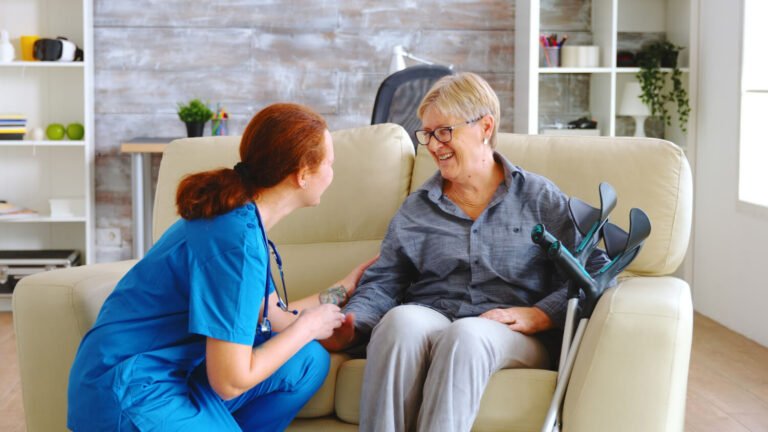How to Effectively Handle Nursing Home Issues
What are some common nursing home issues?

Three of the most common nursing home problems are:
- Poor care
- Staffing shortages
- Unsafe conditions
When my wife received a Parkinson’s disease diagnosis in 2009, I stepped into the role of caregiver. For years, I cared for her at home until her needs grew too great, and she moved into a nursing home. She has now been there for two years, and during this time I’ve learned a lot about the challenges families face in nursing home care.
Some issues are more serious than others, but when they affect the quality of care for a loved one, it can be very stressful.
I have identified many more, but the three I’ve mentioned are the ones I see most often. In a future post, I will share more from my list.
For now, the best step I can recommend is forming a family council. This is a group of family members of nursing home residents who come together to share concerns and work for solutions. By joining voices, families can often make a bigger impact than trying to address issues alone.
Help for nursing home issues is available.
When a loved one lives in a nursing home, you expect them to receive safe, respectful and high-quality care. Sadly, this isn’t always the case. Many family caregivers notice signs of neglect or poor treatment but aren’t sure what to do or who to turn to.
If this situation sounds like you, take heart. You aren’t powerless. You are your loved one’s advocate, and federal law is on your side.
With this post, I’ll walk you through how to handle nursing home complaints, recognize signs of elder abuse and use the resources available, including state ombudsman programs and the Nursing Home Reform Law.
1. Know your rights: The law protects nursing home residents.

Most nursing homes in the U.S. receive funding from Medicare or Medicaid. That means they must follow the Nursing Home Reform Law. This is a federal law that requires them to provide person-centered care to help every resident reach their “highest practicable level of functioning.”
In simple terms, that means your loved one has the right to:
- Get help with basic needs like bathing, eating, and taking medication.
- Choose their own schedule (like sleep and meal times).
- Take part in care planning meetings.
- Refuse unwanted treatment or medication.
- Live in a safe and clean environment.
- File complaints without fear of retaliation.
Knowing these rights is crucial. Many problems happen simply because caregivers and their families aren’t aware of their rights.

2. Spot red flags like signs of abuse, neglect and poor care early.
Sadly, elder abuse can happen anywhere, even in nursing homes. And it doesn’t always look like bruises or broken bones.
Common signs of abuse or neglect include:
- Sudden mood swings, withdrawal or fearfulness.
- Bedsores, infections or poor hygiene.
- Unexplained injuries or frequent falls.
- Missing money, strange bank withdrawals.
- Being overmedicated or restrained without consent.
There are also red flags in how the facility is run:
- Staff say certain services aren’t covered by Medicaid.
- Nurses dismiss your concerns or avoid answering your questions.
- Care plans are generic or ignored.
- Administrators threaten eviction when a loved one complains.
If you see or feel something is wrong, document everything. Write it down. Take pictures. Speak up.
3. Understand how to file complaints and get help.
Every nursing home must have a Grievance Official. This person handles complaints from residents or family members. You can file your concerns in writing or verbally, but they must respond in writing and explain what they did to investigate.
If the problem continues, take these steps:
Step 1: Contact the State Ombudsman Program.
Every state has a Long-Term Care Ombudsman. This is a free advocate who helps residents and families resolve problems with nursing homes. They are independent, and they can:
- Visit the facility.
- Talk to your loved one privately.
- Help you file complaints.
- Push for solutions without fear of retaliation.
Find your ombudsman at eldercare.acl.gov or by calling or sending a text message to trained staff at 800-677-1116.
Step 2: Report to the state inspection agency.

This is usually your state’s health department. They inspect nursing homes, enforce laws and can penalize facilities for violations.
Step 3: Call Adult Protective Services, or APS.
If you suspect elder abuse — especially if it involves harm, neglect or financial exploitation — contact APS in your state. In emergencies, call 911.

Placing your loved one in a facility is never an easy decision, even when it’s the best choice for everyone involved. Unfortunately, nursing home abuse is widespread, making it essential to know what to do if you suspect abuse or neglect. For more information, check out this helpful primer on elder abuse and neglect.
Remember: Federal law prohibits retaliation. Your loved one cannot be punished or evicted just because you speak up or file a complaint.
4. Be familiar with the most common nursing home problems.
Thanks to resources like the Justice in Aging guide, we now know many nursing home problems follow the same patterns. Here’s how to handle them:
Medicaid Discrimination
Some nursing homes offer less care to residents with Medicaid. That’s illegal. All residents must receive the same services regardless of payment source.
What to do: File a grievance and remind staff of the federal law. Seek help from an ombudsman, if needed.
Ignored Care Plans
Care plans must be created with input from the resident and family. If the plan is ignored or not followed, your loved one may not get needed care.
What to do: Attend care plan meetings, ask for updates and put your concerns in writing.
Improper Evictions
Nursing homes can only evict residents for a limited number of reasons, like nonpayment or safety risks. Being “difficult” or refusing medication are not legitimate reasons for eviction.
What to do: Don’t move out. Instead, request an appeal hearing and call the ombudsman.
Overmedication and Restraints
Psychotropic drugs and physical restraints should never be used simply for staff convenience. They require informed consent and must treat a medical condition.
What to do: Say no. Demand a care plan review and document your objection.
Refused Medicare or Medicaid Billing
Some nursing homes refuse to bill Medicare or delay Medicaid applications. Administrators may pressure residents to pay privately. The financial costs of caregiving are stressful enough.
What to do: Insist on proper billing. File appeals if Medicare or Medicare Advantage denies services.
You are your loved one’s best advocate.

Caring for a loved one in a nursing home can be emotionally draining. It can feel overwhelming to confront a facility, especially when you’re tired or afraid of making things worse.
Just remember that you and your loved one have rights, and your voice matters.
Stay organized, keep records, and lean on tools like:
- Grievance officials
- Ombudsman programs
- Resident and family councils
- Adult Protective Services
- Legal aid or elder law attorneys
By being informed and speaking up, you’re doing one of the most loving things a caregiver can do: Standing up for someone who may no longer be able to stand up for themselves.
Nursing Home Issues FAQ
What is the Nursing Home Reform Law?
It’s a federal law that says Medicare- and Medicaid-certified nursing homes must give residents high-quality, person-centered care to help them stay as healthy as possible.
What are common signs of elder abuse?
Look for mood changes, poor hygiene, injuries or unexplained financial changes. Abuse isn’t just physical, it can be emotional or financial too.
Can my loved one be evicted for complaining or refusing care?
No. Complaints are protected by law and residents can refuse medical treatment unless not doing so is a danger to others.
How do I find help in my state?
Find your Long-Term Care Ombudsman at eldercare.acl.gov. You can also get help by calling or texting 800-677-1116.
What if the nursing home bills us for extra charges?
They can’t charge for services already covered by Medicare/Medicaid unless you agreed to them in writing. Refuse to pay unauthorized charges and file a grievance.






